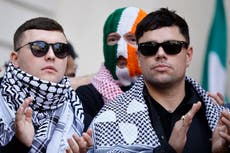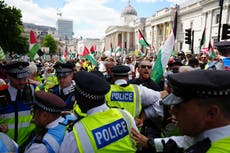Is banning Palestine Action likely to achieve anything?
Sean O’Grady examines the decision by Yvette Cooper to outlaw the group and its supporters, and asks if such a move could prove counterproductive


As things stand, next Tuesday the home secretary, Yvette Cooper, will proscribe the Palestine Action organisation (PA), its members and its supporters, under terror laws. The ban comes after a series of attacks on defence industry establishments and military bases, as well as large demonstrations.
It’s a move that is controversial and has itself provoked further protest. With the prosecution of Liam Og O hAnnaidh, a member of the Irish hip-hop group Kneecap, on terrorism charges, the meaning of “terrorism” does seem to be getting stretched...
What is Palestine Action?
In the organisation’s words: “Palestine Action is a direct action movement committed to ending global participation in Israel’s genocidal and apartheid regime. Using disruptive tactics, Palestine Action targets corporate enablers of the Israeli military-industrial complex and seeks to make it impossible for these companies to profit from the oppression of Palestinians.”
What’s the problem?
They recently broke into RAF Brize Norton – with surprising ease – and set about vandalising, indeed sabotaging, air force planes, spraying red paint into the engine bays. No one was hurt, but it was the fourth such incident involving the group. Their activities, arguably, go beyond the usual definition of peaceful protest, and obviously they themselves advocate “direct action”.
It aids a potential enemy, for sure, because it hinders the UK’s ability to defend itself, but it doesn’t seem to fit the usual template of terrorism, which involves intentional injury to civilians (though the law includes damage to property alone as terrorism).
PA’s proscription places them in the same uncomfortable company as the IRA, al-Qaeda, Isis, the military arm of Hezbollah, Hamas, the Wagner Group, and the fascist National Action (but not, curiously, the Iranian Revolutionary Guard Corps).
On the other hand, the law as it stands is very broad, and counts the “glorification” of terror acts as being in support of terrorism and therefore unlawful – hence the number of people arrested at protest rallies. The definition even includes wordless images, so destroying planes might well fall within its scope. Maybe it’s not so strange, then, to see PA banned.
So why are they being banned?
There are two possible further explanations. First, that there are things about Palestine Action known to the Security Service and the Home Office that would justify such a move, but are not, or can’t be placed, in the public domain. Briefings, for example, by Home Office personnel to the effect that Palestine Action has been funded by Iran – a suggestion that is firmly denied by PA – indicate that there might be other issues. Or it could just be a smear.
The second is that it comes down to raw politics. The government doesn’t want to look weak or biased in the way that it regulates such activities – the “two tier justice” jibe. Also, at some point in the future, some PA direct action exercise could go wrong, cause casualties (to PA, military personnel, police or the public), and/or represent a more serious threat to national security. Cooper doesn’t want to have to look as though she failed to take action against PA in time (and be forced to resign).
What else might be done?
There are numerous laws covering trespass, criminal damage and the like (some would add treason), and indeed, many very wide ones concerning terrorism that don’t necessitate banning PA. These can be applied to anyone, in a proscribed organisation or not. The home secretary plainly doesn’t deem them sufficient, but some other course, short of using terror legislation, could be pursued. Soon, all PA members or “supporters” will be subject to the threat of imprisonment for up to 14 years.
What will happen?
Defiant, passionate, even fanatical by nature, PA people may well continue to organise demonstrations, break into arms factories, and take direct action, and will relish getting arrested, jailed – and becoming martyrs. Some MPs may join them, which will complicate matters.
It’s also difficult for the security services to track terrorist organisations’ membership lists and supporters, and to prove an offence. In other words, individuals and small informal groups of people supporting the Palestinian cause, as they see it, could carry on regardless and undeterred, under the Palestine Action banner or not, and some will no doubt welcome getting caught red-handed.
Join our commenting forum
Join thought-provoking conversations, follow other Independent readers and see their replies
Comments



Bookmark popover
Removed from bookmarks